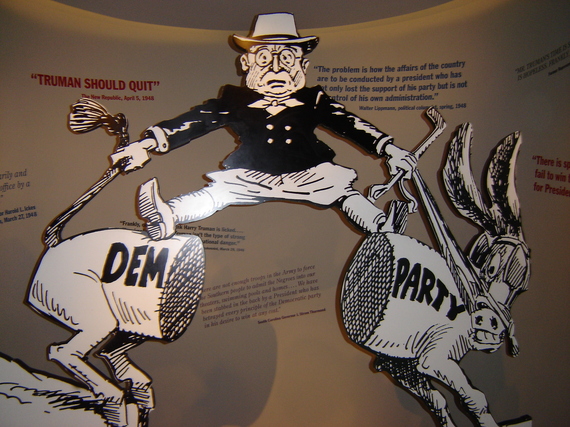It has become fashionable of late to decry long working hours and claim that anyone who beavers away day and night must have some kind of problem or 'personality disorder.' For years, the European Union Working Time Directive has limited weekly work hours to 48, and in most EU member nations, people are well below that limit: France has a 35-hour work week and Sweden has experimented with a six-hour work day.
In the US, where a blue-collar work ethic has long been a part of the national consciousness, recent Presidents have come under fire for taking too much time off. A New York Times blog post claims that George W. Bush had 879 vacation days, including 77 trips to his Texas ranch. And Barack Obama's love of golf has become so controversial - heaven forbid that Presidents take holidays or exercise! - that there's even a dedicated website keeping track of how many rounds the President plays.
There are no such leisure luxuries when it comes to Presidential campaigns, however, at least with regard to Harry Truman's 1948 Whistle Stop Tour. Coming into the campaign, Truman was no stranger to logging mega miles as a politician. When he was an administrator in Missouri's Jackson County, he drove than 20,000 miles at his own expense looking at designs that would inspire a facelift for his county's courthouse in Independence, Missouri. Truman traveled "as far west as Denver, as far east as Brooklyn, and as far south as Baton Rouge, Louisiana," as one account puts it.
Then in fall 1944, as the unlikely running mate chosen by Franklin D. Roosevelt as he sought to extend his 12-year stay in the White House, Truman, who had by then served nine years in the US Senate, again became a road warrior. He made more than 200 speeches for the President and his efforts paid off, as FDR defeated Republican candidate Thomas E. Dewey (for more on the 1944 election, see Michael A. Davis's insightful Politics as Usual).
Less than a year later, Roosevelt was dead. And in the election year of 1948 it was Truman's turn to head the Democratic Presidential ticket, with Dewey again his main opponent. But the former New York Governor wasn't his only rival: J. Strom Thurmond threatened to steal Southern votes as head of the 'Dixiecrats' who opposed Truman's civil rights agenda. And the man who Truman had replaced as Vice President, Henry Wallace (who Truman had fired from his post of Secretary of Commerce for criticizing his unflinching policy toward Stalin's Soviet Union) was sure to win some liberal support as he ran for the Progressive Party.
Truman had alienated the powerful labor unions by smashing their post-World War II strikes, which cost the US economy billions of dollars and threatened to shut down the entire economy in 1945 to 1947, with 4.6 million workers walking out in 1946 alone. In the previous election, FDR had also lost ground in America's heartland, where many farmers turned their support to the Republican Party and helped shrink Roosevelt's victory margin to just over two million votes, by far his narrowest election win. Wall Street donors closed their check books for the man most writers, pundits and pollsters predicted would fall to Dewey come November, leading to Truman pleading for funds.
With so many challenges at home and the distraction of the Berlin Blockade abroad, what was Harry Truman to do? Concede the Democratic Party nomination and let someone else run? Not likely. Sit on his hands and let Dewey and his "Victory Special" train waltz to the White House? Not a chance. "I'm going to take Dewey like that!" Truman told Clark Clifford and the rest of his campaign team in a summertime strategy meeting, snapping his fingers for emphasis.
Truman had already traveled more than 9,000 miles on a June 1948 tour out west, giving over 100 speeches to voters he implored to vote for him instead of for what he called "the party of privilege." Now his advisors had planned 250 more talks, which would take Truman more than 22,000 additional miles as he went back and forth across America. His team worried about the physical toll of such an ambitious schedule on the President, who had suffered migraines and stomach issues from work-related stress in the past and whose age (64) put him at another disadvantage to the 46-year-old Dewey. "I'll be alright," Truman assured them with a trademark grin. "It's YOU I'm worried about."
Click here to finish reading this story via The Huffington Post.
Want to learn more? Then click here to order my new book, Whistle Stop: How 31,000 Miles of Train Travel, 352 Speeches, and a Little Midwest Gumption Saved the Presidency of Harry Truman.
If you'd like to purchase a signed copy of Whistle Stop and/or my previous book, Our Supreme Task, please leave a comment or e-mail me.

No comments:
Post a Comment